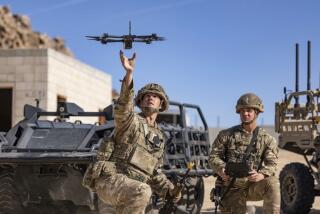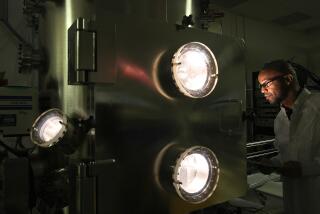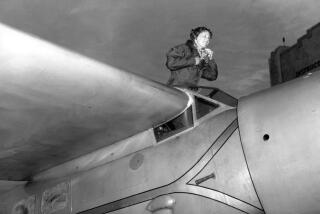Timothy E. Conver, CEO of drone maker AeroVironment, thinks small
The gig: Timothy E. Conver, 67, is chief executive of AeroVironment Inc., the Monrovia-based manufacturer of swarms of tiny robotic spy planes that are being launched into the skies over Afghanistan.
Hot planes: Once thought to be high-tech toys for aviation enthusiasts, remote-controlled planes play a crucial role in modern warfare. There are thousands of AeroVironment planes in the war zone and 1,300 more in next year’s Pentagon budget. The company is the nation’s largest provider of small drones, which have names such as Raven, Wasp and Digital Puma. Last year its Pentagon sales totaled more than $200 million.
Hummingbirds: The hot new creation in the company’s menagerie of potential military drones is its tiny battery-powered Nano Hummingbird, built to look like a bird for potential use in spy missions. Equipped with a camera, the drone can fly at speeds of up to 11 mph. It can hover and fly sideways, backward and forward, as well as go clockwise and counterclockwise, by remote control for about eight minutes.
Family fun: Last month, Conver brought his wife of 40 years, Barbara, to AeroVironment’s Simi Valley office to watch a rare public display of the bird in action. One of his three adult children also came to the event. “They think that stuff is just great,” he said.
Climbing the ladder: Conver received a bachelor’s degree from the University of Montana and later got a master’s degree in business administration at UCLA. While working in the aerospace industry, he had a chance meeting with AeroVironment founder Paul MacCready and bought a stake in the company. Conver has been chief executive since 1993 and owns about 15% of the company’s shares. His total compensation last year was $757,650.
His advice for newcomers: “Choose the work you wish to do and the way you wish to do it based primarily on what makes you happy and most fulfilled — good things will follow.”
Ahead of the curve: Conver said AeroVironment started small, leaving larger drones to the big boys such as Northrop Grumman Corp. and Boeing Co. It went after smaller lucrative projects such as the hand-launched drones his company has specialized in for nearly a decade. “That’s just fine with us,” Conver said with a chuckle. “We’ve been working on developing this technology since 1986. It took two decades before the government caught up with us.” The company is starting to look at large projects and is developing the Global Observer, a robotic spy plane with a 175-foot wingspan.
Not just for the birds: Although more than 80% of the company’s work is done for the Pentagon, AeroVironment also produces charging stations for electric cars, most notably Nissan’s all-electric Leaf passenger car. As with the company’s development of the mini-drones, AeroVironment engineered the charging systems — largely on its own dime — before the rest of the world caught up. “We are on the cutting edge of technology here,” Conver said. “This company has never been daunted by complexity.”
Out-innovate: Conver relies heavily on the ingenuity of his engineering team’s members and their ability to foresee trends before they happen. “This is not traditional aerospace engineering,” he said. “We have an incredible cadre of people here. We try to give them every tool we can. Their success will propel the company forward.”
The great outdoors: An avid outdoorsman with a penchant for skiing, hiking and camping, Conver grew up in Montana and now lives in the northern San Fernando Valley. Along with his two sons, he enjoys fly fishing in the Sierra Nevada. He likes a little adventure, he said. “That way you discover new things. You find out more about yourself.”
Keeping it simple: On the AeroVironment manufacturing floor in Simi Valley, workers wearing blue smocks sit at workstations snapping together the small planes. The drones are placed on table tops and packed onto shelves awaiting assembly. Conver’s office on the second floor is spartan but offers wide views of the surrounding Simi Valley hills. “I like to keep things simple,” he said.







